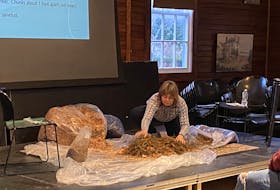DURHAM, N.S. - With a bouquet of roses tucked under one arm and a small dog under the other, a Presbyterian minister named Donald Walker MacKay arrived at Norma Wood’s front door.
The roses were for Norma’s mother, Alice. It was Dec. 28, 1984. Alice was retiring as the church organist. The congregation had wanted to give her roses, but church had been cancelled because of a snowstorm. The roads were impassable, so MacKay had to use skis to get to their house.
When he arrived, MacKay saw that he wasn’t the Woods' only visitor.
“That was quite a day,” recalled Wood. She and her husband Clifton were snowed in along with their two children, her mother, and a complete stranger.
“The five of us, and a wet man.”
Neither Norma nor Clifton can remember that man’s name, but they do remember his entrance.
“That morning I heard a knocking at the door, so Clifton went down and the man literally nearly fell in through the front door he was so exhausted.”
The stranger had gotten stuck in a snowdrift further up the road. He’d sat there until the car battery died and struck out into the still blowing snowstorm on foot.
“He probably would have had hypothermia if he had kept walking toward the bridge,” said Wood speaking about the West River crossing less than 100 metres from the Presbyterian church in Durham.
“I played for 121 funerals in Durham. And I had 33 weddings.” Organist Norma Wood
It was only after the man had been given some of Clifton’s dry clothes and cup of coffee that they saw the priest skiing down their driveway.
Alice Gryce had been the organist at West River Presbyterian for 46 years. Her daughter Norma took her place.
On Dec. 30, 2018, it was Norma’s turn to say goodbye. The last Sunday service of 2018 wasn’t as stormy as the one 34 years ago. Norma told the story of her mother’s retirement day to an appreciative congregation, ending it by saying:
“So, my last day was much more pleasant.”
Some 50 people had come to church Dec. 30 to worship and bid farewell to their organist and choir director. After leading them in a last hymn of “Joy to the World”, the congregation gathered in the church hall for lunch.
“I dearly loved it. It was a joy. And I also want to thank the faithful members that we had in our choir and have yet,” said Wood emphasizing the word “faithful”, and all the while holding onto a small sheet of white paper.
“We lost a good many members, but anyway that’s life,” she continued. “Mom said in her later years of playing ‘I only wish I’d kept a record for all the funerals I played for.' So, I did.”
Norma Wood looked briefly at the paper and then shared the record with the room.
“I played for 121 funerals in Durham,” said Wood. “And I had 33 weddings.”

The vanishing church
The Durham church was built in 1856 after the first one was destroyed by fire. Before that, highland Presbyterians worshiped at a church built like a log cabin in Loch Broom. Today there are 35 churches in the Pictou Presbytery.
Each of those churches once had full congregations and ministers would deliver up to three services each Sunday in order to attend to each of them. However, faced with dwindling congregation numbers, some of these churches started to merge their congregations and pool their recourses. One of them was West River Presbyterian.
“Every third month we’re in a different church building,” said Rev. Mary Anne Grant. “We come together as one instead of meeting with just ten or 15 people.”
“Members pass away and there’s no line up at the door to be a member of a congregation." - Rev. Mary Anne Grant
Grant leads the congregations at West River Presbyterian in Durham, as well as St. Luke’s and Salem in Salt Springs and Green Hill respectively.
Fewer and fewer people attending Sunday service was a big reason for the amalgamation. And the trend in declining congregations is not only felt in parts of rural Nova Scotia. The most recent data from Stats Canada show that the frequency of religious attendance between 1985 and 2005 dropped by 30 per cent among citizens aged 15 and over.
Stats Canada also found that older Canadians were more likely than younger Canadians to attend religious service on a regular basis.
This trend was also reflected in more recent studies out of the Pew Research Centre which showed that the number of people who said that they attend religious services once per month had dropped from 43 per cent to 27 per cent.
“Members pass away and there’s no line up at the door to be a member of a congregation,” said Grant. “Society has changed in a lot of ways and the church is not a priority.”

Adaptation
Before pursuing the ministry, Rev. John Dunnett was on track to a career in psychology. He was going to be a youth counselor.
“As I came to the end of my undergrad I remember sitting in the area between the Crabtree building and the library at Mount Allison,” he said inside his office at First Baptist Church in New Glasgow.
“I was wrestling with this reality from my psych background that I could help people deal with their problems in about four or five different ways depending on which field I wanted to apply to their problem. But as I looked around, the thing that I saw have the deepest impact on someone’s life was a personal encounter with Jesus.”
With the interplay between individuals, society and the church changing, some church leaders are changing the ways through which they facilitate that kind of encounter. And in order to maintain connections with an increasingly disconnected congregation Dunnett’s pastoral care makes use of a network which he calls a "spiritual care circle."
“We’re realizing that the future lies in developing a smaller network that facilitates people caring for each other,” said Dunnett.
“Everyone is in a spiritual care circle. They’re either active or passive,” says Dunnett. “Active people meet a couple of times each month and encourage each other with what they’ve been learning from scripture and from life experience. They also commit together to be praying for God’s blessing for all the people in the circle.”
Spreading the responsibility of pastoral care around the circle allows Dunnett to focus more energy on the people in the circle who need extra attention.
“There’s been involvement with those who are dealing with substance abuse, or with those who have sickness in their family, especially if there’s sickness in children,” says Dunnett. “Illness, death, the process of grieving after death.”
“We’re realizing that the future lies in developing a smaller network that facilitates people caring for each other." - Rev. John Dunnett
These kinds of challenges are not new, but the ways that people cope with them are.
Dropping congregation numbers is not the only side to this story. While the rate of people who are religiously unaffiliated is rising, there has also been a growing number of people who identify with religions that fall outside of mainstream religions in Canada.
According to a Pew Research Centre study, the percentage of people identifying as something other than Protestantism and Catholicism in Canada rose from four per cent to 11 per cent between 1980 and 2010.
“When people say that ‘I’m spiritual but not religious', they allude to the fact that they deeply want to know why they’re here and what’s the purpose of life,” says Rev. Donna Tourneur at Trinity United Church in New Glasgow. “But they’re not going to fall into the old story line that says God created the world in six days and on the seventh day he rested.”
Tourneur started as a lay minister in Cape Breton in 1991.
She worked in a team with the ordained minister. He was in charge of worship, sacraments, and pastoral care, and education, group work and community outreach fell under Tourneur’s jurisdiction.
“There’s a theological shift,” she says.
“It used to be that people were taught what to believe. When they knew what it was they had to believe they were invited to belong, and when they belonged there was an expectation to behave in a certain way,” she said.
“It’s completely different now. Now you come to a church to find out if it’s a place you want to belong. If you feel like you belong there, then that might shape how you behave, and when you behave in a certain way, then that shapes what you believe.”
The reversal of the believe, belong, behave framework first outlined by Christian scholar Diana Butler Bass in her book “Christianity After Religion” has shaped the ways in which churches like Tourneur’s have chosen to adapt and remain central in the community.
“So, it’s more about making programs that people are going to like to come to and belong to, but making sure that those people in our community are also cared about,” says Tourneur.
No replacement
The West River Presbyterian church still hasn’t found a replacement for Norma Wood. The congregation has moved to Salt Springs for the month of February, so they have a month to find someone.
Wood is hopeful that they will, but admits that it could be difficult.
“Organists are as scarce as hens’ teeth, so I don’t know what will take place.”
RELATED









